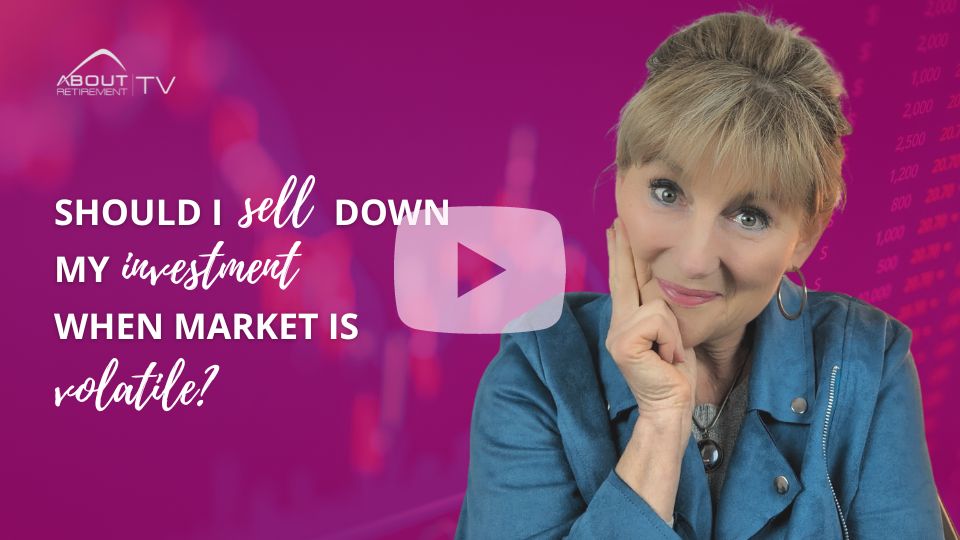
Should I sell down my investment and keep all my super in cash due to volatility?
In the last year, market has proven to us that it can be pretty volatile and unpredictable. I had lots of people asking me if they should sell down their investments either privately owned, so invested on their personal names or under any other structure such as trust or a company, as well as investments held within superannuation.
I always hear that cash is better and safer. So let’s look into this a little bit deeper to understand if such decision is good or not in current market conditions, and what impact it can have on your overall value of assets, value of your estate and your income, especially in retirement.
Before I get into our today’s topic, I would like to say something important. I started My YouTube Channel and weekly Newsletter to my own clients and subscribers coincidently just before Covid in January 2020. Today’s video and article is number 179.
I’ve never realised how much of the impact this would have on pre and post retirement community, how much enjoyment I will get out of it, seeing people that are willing to learn, are willing to absorb my explanation of complex rules and regulations that we have around superannuation, government benefits, contributions, savings, investing, estate planning, the list is long.
I do not have a huge team behind me, I started this weekly communication with a sheer believe that I can make a difference in lives of some people, purely because I was lucky and privileged to step into the profession and can impact every single part of our lives.
But after doing it for 3 years week after week, I can see and feel the toll it has on me, my family, the little time I have left for my family, friends and even myself. Also, I do need to devote more time to my practice clients, as they deserve a great deal of care and assistance.
For this reason, I would like to say that I will continue my work, but from now on, my Newsletters will be coming out once a fortnight rather then weekly. This will give me a bit of space and air to have time for other things as mentioned before.
Also, another reason is that I want to keep my updates interesting and relevant for you, with a quality contents and immediate benefit that you can apply to your lives of what to do or what not to do, which is just as important.
So here it is my big announcement, I am most certainly continuing to keep you informed, but from now on, you will be receiving my Newsletters on fortnightly basis, rather then weekly.
So after that explanation, let’s jump back to our market volatility issue and what you should do in such circumstances, should you sell your investments and hide money in cash or should you continue holding on investments that are slowly reducing in value.
Markets have been volatile terribly in 2023. Have a look at this chart, we can easily see that whatever balance we started investments with, at the beginning of 2023, that’s what we ended up today, almost the end of 2023. And we can clearly see all the ups and downs from month to month, and this is exactly what scares lot of people, and they sell investments and run to the safety of cash.
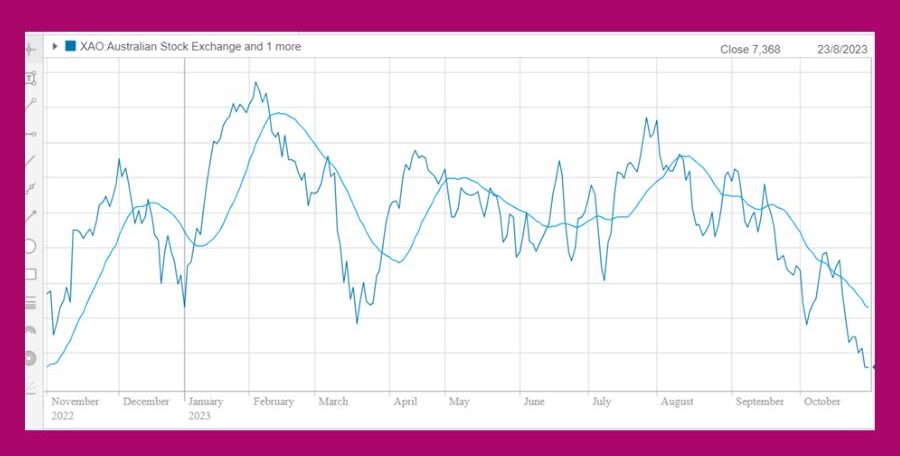
As we know, from investing perspective 1 year is a very short investment timeframe and you should never invest money if you know you will need it in one year, as this is exactly an example, that you not only did not any benefit out of investing, but you could end up with less than when you started.
But let’s just expend the timeframe for a slightly longer period of 3 years. Can you see now how this volatility of the current year becomes so much less if we expend perspective.
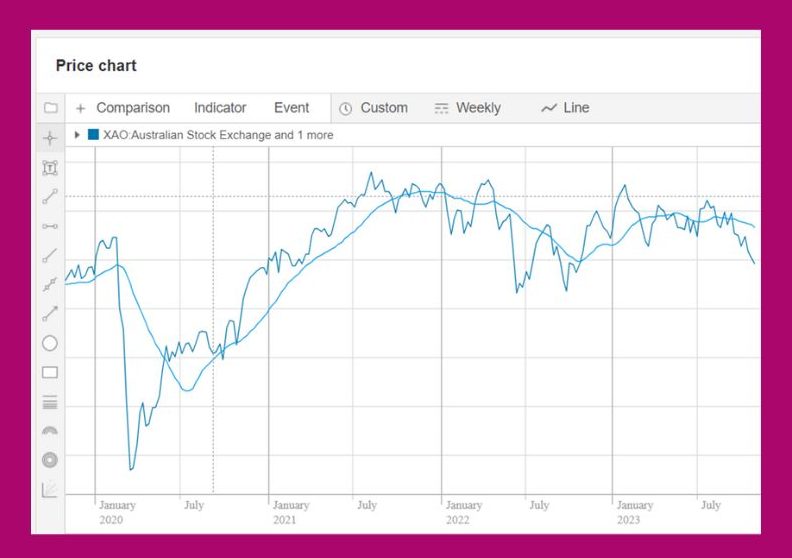

One think that I wanted to point out here is the second chart, that shows market transaction volume. Can you see the huge selling frenzy happening in Feb 2020? This is when markets collapsed due to covid. The sheer size of selling was unprecedented, people trying to hold on to as much of their money as possible, while the market was in freefall. But the unfortunate outcome of this behaviour is that no matter at point in time those investors returned to investments, they would not be able to make up the losses. It is impossible, even for professional investors to know when the market will turn around, so you can reinvest safely.
This is an example of how best to lose your savings, not how to save it from losses. As you can see in the chart, markets recovered very fast, so fast indeed that most people were taken by surprise when it started falling and consequently when it was rising.
But those who did not sell and hold their grounds came out on the top, Yes, it can be frightening, yes we all worry “what if..” but this has been the case since markets exist, and if you wish to make any return on your savings and you want to make your money work for you, unfortunate part of the deal is that you have to accept some degree of investment risk.
That investment risk can be minimised by many different strategies, which is essential especially in retirement, but none the less, financial and market risk is part of investing. If you want to remove that risk, then we are talking about cash investing, which is proven over a long period of time does not even keep up with inflation.
And now if we look at market chart over the period of 10 years the picture is different again, with those annual drops becoming less significant.
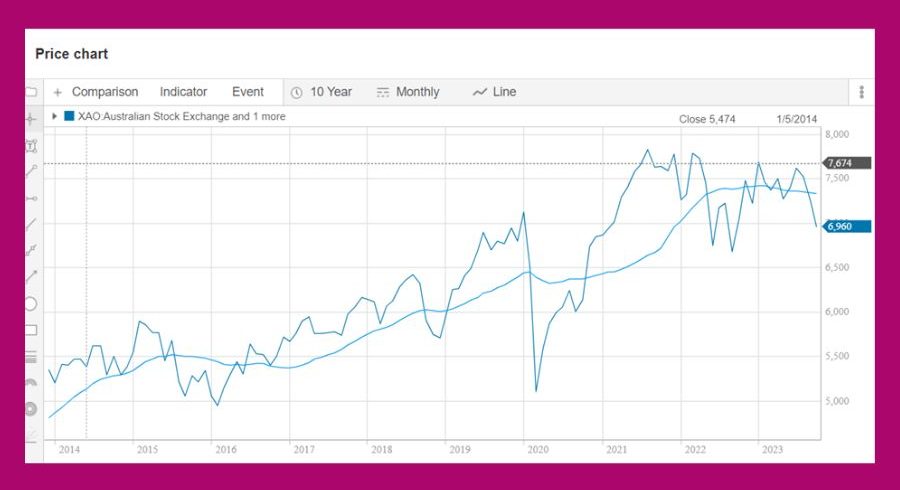
And now since 1994 therefor over the period of 30 years, the picture is completely different, with the biggest drops due to GFC (Global Financial Crisis) and Covid.
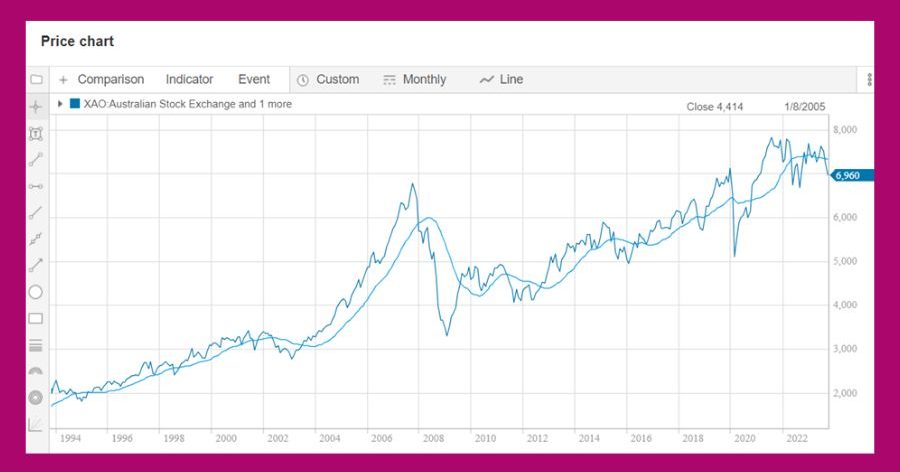
This is the whole point of this story; short term drops are only just that short term market adjustments to various news. If you react to every single negative news, you will keep losing money on both ends, selling when the market has already fallen and on the rise, as you will never be able to predict the market bottom, therefore you will lose most of the recovery time.
I hope this information will help you to reduce your worries when markets are unpredictable and volatile, please remember the is low correlation between those political events and market returns. Yes, markets will be impacted in a short-term, but they have very little impact on markets long-term and you have to keep this in mind, not to keep on losing your hard-earned money.
If you found this information of benefit and would like an assistance and advice within investment management or you are thinking of retiring soon or you have already retired, you know that this is my little specialty, hence the business name About Retirement. If this is you, book a meeting with me via my website, to discuss your situation and how it could be improved, and benefits maximised for your retirement.
By: Katherine Isbrandt CFP®
Money Strategist & Retirement Planner
Principal of About Retirement






